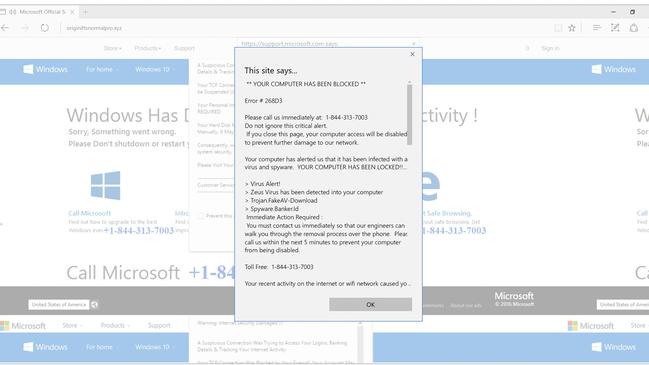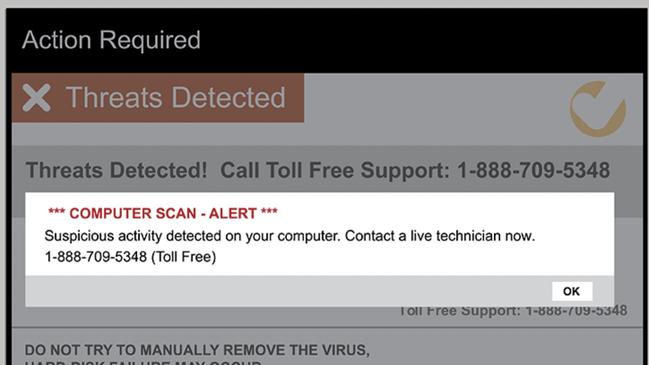Tech support scams: why more Aussies are falling victim and losing millions to fake helpdesks
Sneaky new moves are fuelling a fresh crime wave, with Aussies losing $8 million and one couple robbed of $165,000. See how you can detect them.
Security
Don't miss out on the headlines from Security. Followed categories will be added to My News.
More Australians are being robbed by fake tech support scammers, with Aussies now the third most likely to fall for the trick worldwide and some victims being stung for tens of thousands of dollars.
The scams, commonly delivered over phone calls and in alarming website warnings, reached more than two in three Australians during 2021, according to Microsoft’s Global Tech Support Scam Research, and almost one in 10 Aussies targeted lost money — more than any other country outside India and the US.
In one particularly disturbing case, an older couple from regional New South Wales lost $165,000 last month after criminals gained access to their bank accounts using their smartphones.
Microsoft Digital Crimes Unit Asia assistant general counsel Mary Jo Schrade said the study of more than 16,000 people in 16 countries showed Australians were targeted by scammers more often, more had fallen victim to the scam, and more lost money after criminals gained direct access to their bank accounts.

“The pool of people (these scammers) need to hit to make a lot of money can be very small,” she said.
“If only one per cent of the people responded that would still be a good income for them and we’re seeing much higher numbers in Australia responding.”
The Microsoft study found 68 per cent of Australians were targeted by helpdesk scams in 2021, 19 per cent took action on the scam, and nine per cent lost money.
Australians have lost $8.1 million to remote access scams in this year alone, according to the Australian Competition and Consumer Commission — more than twice the losses in 2020.

IDCare analyst Kathy Sundstrom said Australians were “trusting by nature” but that trust was being exploited by criminals using increasingly sophisticated methods to steal their money.
She said one elderly couple in NSW was recently told to expect a $19.99 refund, only to be stung by a fake claim that the scammer had overpaid.
“The scammer said, ‘oh no, I’ve transferred $19,990, I’ve made a terrible mistake, please transfer the money back’,” Ms Sundstrom said.
“In case of this couple, the husband then went to the bank and transferred the money to the scammers out of his account.”
Betty, a retiree from Albury in New South Wales, who asked to remain anonymous, said she and her husband lost $165,000 to a computer helpdesk scam in June after responding to an alarming pop-up warning on a website.

The message made their computer play a “really loud, terribly high-pitched sound” that Betty said they could not stop nor ignore.
“It was really disorientating,” she said, “so my husband rang the number and the noise stopped, and then he went though the process with someone who said they were with Microsoft”.
The couple downloaded and installed remote access software on their computer and both of their smartphones. After waiting three days, she discovered scammers had used this access to steal large sums of money from her accounts.
The scammers even phoned after the incident, pretending to be from her bank.
The theft is currently being investigated by the Federal Police and, while $9000 had been recovered from one transaction, Betty said she was still waiting for an outcome from Hume Bank.

“It was a significant amount of money that we lost but I’m surviving cancer and I’m not going to let this beat me,” she said.
“For a lot of people, losing that money would destroy them, especially in this Covid environment. That’s what frightens me more than anything.”
Australians who suspect they have been stung by a Helpdesk scam can report it to the ACCC’s Scamwatch, the Australian Cyber Security Centre’s ReportCyber and Microsoft, and can get help from IDCare on 1800 595 160.
HOW TO SPOT A TECH SUPPORT SCAM
– Pop-up windows on your computer that play a loud noise or an audio recording are not legitimate tech support warnings
– Do not call any phone number that appears in a pop-up warning. Microsoft error messages never contain phone numbers
– If you are urged to contact a tech firm, look up the phone number independently and check the web address of the website you visit
– Tech firms like Microsoft, Apple, Google and Facebook do not monitor your computer for problems and will not send unsolicited messages or make unsolicited phone calls about them
– Do not install software on your computer or smartphone unless you are confident of the technical support you’re receiving. These programs give third parties full control of your device and access to sensitive information
– Be aware that scammers can display images on your computer that make it look like your web browser has been compromised or that they have sent you a refund in error. Do not return their ‘refund’
– Scammers will try to make issues seem urgent to rush you into making a poor decision
Originally published as Tech support scams: why more Aussies are falling victim and losing millions to fake helpdesks





